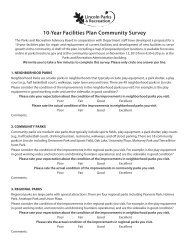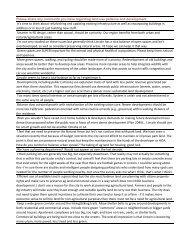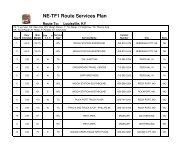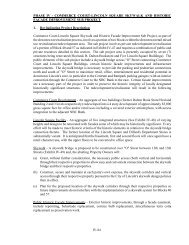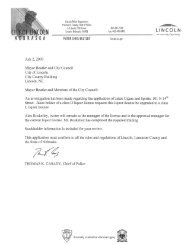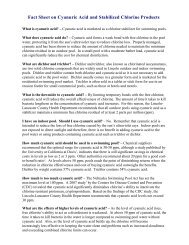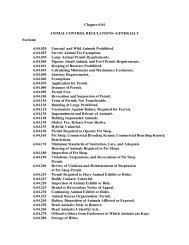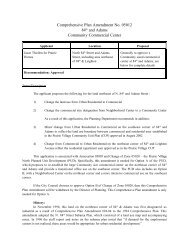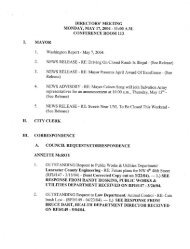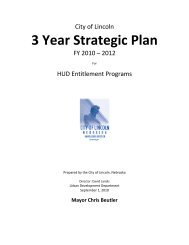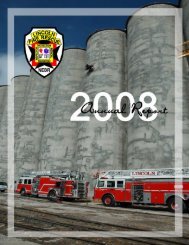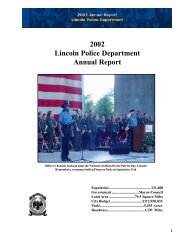Mayor's Group Home Task Force - City of Lincoln & Lancaster ...
Mayor's Group Home Task Force - City of Lincoln & Lancaster ...
Mayor's Group Home Task Force - City of Lincoln & Lancaster ...
You also want an ePaper? Increase the reach of your titles
YUMPU automatically turns print PDFs into web optimized ePapers that Google loves.
Mayor’s <strong>Group</strong> <strong>Home</strong>s <strong>Task</strong> <strong>Force</strong> Final Report<br />
February 10, 2005<br />
Executive Summary<br />
In May, 2004, <strong>Lincoln</strong> Mayor Coleen Seng commissioned a citizen task force to examine the <strong>City</strong>’s<br />
laws and regulations governing group homes and congregate housing. The task presented<br />
included evaluating the needs <strong>of</strong> the <strong>City</strong>’s special populations, the integrity <strong>of</strong> services, and the<br />
stability <strong>of</strong> neighborhoods.<br />
The <strong>Task</strong> <strong>Force</strong> gathered input from <strong>City</strong> and County Staff, service providers, neighbors, and<br />
persons with disabilities and their families. The process <strong>of</strong> finding a balance between all <strong>of</strong> the<br />
interests and concerns <strong>of</strong> the people who participated was challenging, due to the intensity <strong>of</strong> the<br />
viewpoints expressed. However, we were able to agree on some general statements to define the<br />
issues before us.<br />
• Service providers and their residents have asked for greater flexibility within the regulations<br />
to allow them to site a residential facility without having to meet the current separation and<br />
occupancy limitations.<br />
• Neighbors have expressed concerns over disruptive residents and under-trained staff to<br />
manage the facility and its residents, which they argue leads to increased crime and lower<br />
property values.<br />
• The effects a group home has on its neighborhood result from the management and<br />
operation <strong>of</strong> the group home, not merely from the home’s existence. <strong>Home</strong>s that are run<br />
well and regularly maintained can blend seamlessly into their neighborhoods.<br />
• The <strong>City</strong> does not provide a well-defined process for persons with disabilities to request a<br />
reasonable accommodation from the regulations. The current spacing and occupancy<br />
limitations are reasonable, provided there is a mechanism to waive the requirements on a<br />
case-by-case basis.<br />
• The State has primary regulatory responsibility over these uses and the authority to<br />
encourage improved operation and facility maintenance through licensing.<br />
We have prepared recommendations for the <strong>City</strong> <strong>of</strong> <strong>Lincoln</strong> as well as the State <strong>of</strong> Nebraska. We<br />
feel our recommendations appropriately address the roles <strong>of</strong> each regulatory body. During our<br />
work, we have witnessed an increase in the amount <strong>of</strong> cooperation and communication between<br />
the <strong>City</strong> and State, and encourage this new dialogue to continue. We believe the partnership<br />
evolving between the <strong>City</strong> and State will strengthen safety and services within the community.<br />
Mayor’s <strong>Group</strong> <strong>Home</strong>s <strong>Task</strong> <strong>Force</strong> Final Report - February 10, 2005 1
MAYOR’S GROUP HOMES TASK FORCE<br />
Jon Carlson, Chair<br />
Roger Massey<br />
Jim Blue<br />
Larry Potratz<br />
Dean Settle<br />
Larry Williams<br />
Kit Boesch<br />
Jonathan Cook<br />
Tom Casady<br />
Chuck Zimmerman<br />
Rick Peo<br />
Mayor’s <strong>Group</strong> <strong>Home</strong>s <strong>Task</strong> <strong>Force</strong> Final Report - February 10, 2005 2
I. Introduction<br />
The Mayor’s <strong>Group</strong> <strong>Home</strong>s <strong>Task</strong> <strong>Force</strong> (<strong>Task</strong> <strong>Force</strong>) was asked by Mayor Coleen Seng to examine<br />
the <strong>City</strong>’s laws and regulations governing group homes and congregate housing. The task, derived<br />
from a Comprehensive Plan requirement and outlined by the Mayor, is to balance the objective <strong>of</strong><br />
providing effective and efficient services to the <strong>City</strong>’s special populations while protecting the<br />
integrity and stability <strong>of</strong> <strong>Lincoln</strong>’s residential neighborhoods. The <strong>Task</strong> <strong>Force</strong> held its first meeting<br />
on June 29, 2004, and was asked to complete its work within four months.<br />
The <strong>Lincoln</strong>/<strong>Lancaster</strong> County Comprehensive Plan directs the <strong>City</strong> to “revise the congregate living<br />
facility codes in order to provide housing opportunities for residents with special needs throughout<br />
the city that are compatible with residential neighborhoods.” The Comprehensive Plan goes on to<br />
state that congregate facilities should be designed and located to enhance the surrounding<br />
neighborhood. Reasonable spacing, design, and operational requirements should be created for<br />
all congregate facilities to preserve the neighborhood character while providing for those with<br />
special needs.<br />
The <strong>City</strong> <strong>of</strong> <strong>Lincoln</strong> regulates group homes and other congregate living arrangements through<br />
several ordinances. The <strong>Task</strong> <strong>Force</strong> was asked to focus on the zoning ordinance and recommend<br />
any changes necessary to improve the <strong>City</strong>’s ability to provide appropriate housing opportunities<br />
for people with special needs. However, any recommended changes also should be compatible<br />
with <strong>Lincoln</strong>’s existing neighborhoods.<br />
II. Jurisdiction<br />
The <strong>City</strong> <strong>of</strong> <strong>Lincoln</strong>, through its charter, is empowered to enact zoning ordinances to regulate and<br />
restrict the location, height, bulk, and size <strong>of</strong> buildings and other structures; the density <strong>of</strong><br />
population; and the locations and uses <strong>of</strong> buildings, structures, and land for trade, industry,<br />
business, residences, and other purposes. These regulations are grounded in the <strong>City</strong>’s police<br />
powers, and based upon the promotion <strong>of</strong> the health, safety, morals, or general welfare <strong>of</strong> the <strong>City</strong>.<br />
Based on the <strong>City</strong> Charter, zoning regulations “shall be made with reasonable consideration having<br />
been given to, among other things, the character <strong>of</strong> the various parts <strong>of</strong> the area zoned and their<br />
peculiar suitability for particular uses and types <strong>of</strong> development, and with a view to conserving<br />
property values and encouraging the most appropriate use <strong>of</strong> land throughout the zoned area.”<br />
<strong>Lincoln</strong>’s zoning jurisdiction includes the area within three miles <strong>of</strong> its corporate limits.<br />
In addition to the fundamental limitations on the exercise <strong>of</strong> police powers, there also may be<br />
federal statutory requirements or case law that further addresses local land use controls.<br />
Specifically, the regulation <strong>of</strong> residential land uses as applied to persons with disabilities is<br />
addressed in the Fair Housing Amendments Act (“Act”) (42 USC §§3601-3631). Since passage<br />
<strong>of</strong> the Act, multiple court cases have attempted to define its provisions in a land use context.<br />
III. Defining the Issues<br />
The <strong>Task</strong> <strong>Force</strong> devoted the first several meetings to developing an understanding <strong>of</strong> the local,<br />
state, and federal rules and regulations, as well as, the perspective <strong>of</strong> state and local <strong>of</strong>ficials,<br />
service providers, and neighbors. This information was compiled through discussions with the <strong>Task</strong><br />
<strong>Force</strong>, and used to frame the land use implications within the context <strong>of</strong> existing local controls and<br />
federal guidelines.<br />
Mayor’s <strong>Group</strong> <strong>Home</strong>s <strong>Task</strong> <strong>Force</strong> Final Report - February 10, 2005 3
A. Existing Regulations<br />
Generally, residential dwellings in the <strong>City</strong> <strong>of</strong> <strong>Lincoln</strong> fit within one <strong>of</strong> three categories: single-family,<br />
two-family, or multiple-family. Each category is defined by the number <strong>of</strong> dwelling units it contains;<br />
a single-family dwelling has one dwelling unit, a two-family dwelling has two dwelling units, and a<br />
multiple-family dwelling has three or more dwelling units. Each dwelling unit is occupied by one<br />
family. The use <strong>of</strong> a structure for residential purposes, then, turns on whether the inhabitants fit<br />
within the definition <strong>of</strong> “family.” The <strong>Lincoln</strong> Municipal Code (LMC) defines family as:<br />
One or more persons immediately related by blood, marriage, or adoption and living<br />
as a single housekeeping unit in a dwelling shall constitute a family. A family may<br />
include, in addition, not more than two persons who are unrelated for the purpose <strong>of</strong><br />
this title. The following persons shall be considered related for the purpose <strong>of</strong> this<br />
title:<br />
(1) A person residing with a family for the purpose <strong>of</strong> adoption;<br />
(2) Not more than six persons under nineteen years <strong>of</strong> age, residing in a foster<br />
home licensed or approved by the State <strong>of</strong> Nebraska;<br />
(3) Not more than four persons nineteen years <strong>of</strong> age or older residing with a<br />
family for the purpose <strong>of</strong> receiving foster care licensed or approved by the<br />
state or its delegate;<br />
(4) Any person who is living with a family at the direction <strong>of</strong> a court.<br />
(LMC §27.03.220)<br />
Any number <strong>of</strong> related individuals may reside together as a family, or up to three unrelated<br />
individuals may reside together as a family. Individuals, whether disabled or not, meeting the<br />
definition <strong>of</strong> family are not subject to further land use or zoning controls. Using this definition,<br />
persons who wish to reside together are distinguished based upon familial status, or relationships.<br />
Persons who are unrelated cannot live together as a family in excess <strong>of</strong> three individuals.<br />
Within the category <strong>of</strong> unrelated individuals, certain people are afforded some relief from numerical<br />
limits on occupancy. Anyone who fits within the definition <strong>of</strong> group home may apply for a permit<br />
allowing up to fifteen unrelated persons to reside together. This requires, first, they meet the<br />
definition <strong>of</strong> group home; and second, they meet the conditions <strong>of</strong> the permit. A group home is<br />
defined as follows:<br />
<strong>Group</strong> home shall mean a facility in which more than two but less than sixteen<br />
persons who are unrelated by blood, marriage, or adoption reside while receiving<br />
therapy or counseling, but not nursing care, for any <strong>of</strong> the purposes listed below.<br />
Such facility shall be licensed or approved by the State <strong>of</strong> Nebraska or other<br />
appropriate agency.<br />
(a) Adaptation to living with, or rehabilitation from, the handicaps <strong>of</strong> physical<br />
disability;<br />
(b) Adaptation to living with, or rehabilitation from, the handicaps <strong>of</strong> emotional<br />
or mental disorder, or mental retardation;<br />
(c) Rehabilitation from the effects <strong>of</strong> drug or alcohol abuse;<br />
(d) Supervision while under a program <strong>of</strong> alternatives to imprisonment, including<br />
but not limited to pre-release, work-release, and probationary programs.<br />
(LMC §27.03.300)<br />
<strong>Group</strong> homes are permitted in all residential districts through a conditional use permit. This<br />
administrative permit is issued by the Building and Safety Department. There are three general<br />
conditions, two <strong>of</strong> which are the same in all residential districts. These two conditions combine to<br />
Mayor’s <strong>Group</strong> <strong>Home</strong>s <strong>Task</strong> <strong>Force</strong> Final Report - February 10, 2005 4
equire the facility to comply with all other applicable zoning and sign requirements, and maintain<br />
a current State license. The third condition requires group homes to maintain a separation from<br />
one another. The required distance is either one-half mile or 1,200 feet, depending on the district.<br />
There is no discretion or public participation in the process. Once an applicant meets the<br />
conditions, a permit is issued.<br />
A facility for sixteen or more residents is allowed by special permit as a health care facility, which<br />
is allowed in all residential districts and some commercial districts. The definition and permit<br />
process for a health care facility generally targets hospital-type service settings, such as nursing<br />
care. The public is involved through public hearings, before both the Planning Commission and<br />
<strong>City</strong> Council. Since there are sixteen or more residents, these facilities do not meet the definition<br />
<strong>of</strong> group home.<br />
When the occupancy <strong>of</strong> a residence changes from single-family to group home, building code<br />
requirements may stipulate changes to the dwelling. The Building and Safety Department inspects<br />
structures for compliance with adopted building and safety standards. The International Building<br />
Code is a city-adopted guideline for building construction, enforced by the <strong>City</strong> as part <strong>of</strong> the <strong>Lincoln</strong><br />
Municipal Code. The Life Safety Code is a State regulation enforced by the State Fire Marshal;<br />
when the Building and Safety Department enforces the Life Safety Code, they do so as the local<br />
enforcement agent for the State.<br />
The Life Safety Code treats a group home residence with four or more occupants as a “board and<br />
care” facility, and places further restrictions on the use. Such restrictions may include greater floor<br />
separations, stair separations that include fire-rated wall coverings and doors, and commercial fire<br />
sprinkler systems.<br />
B. State Regulation <strong>of</strong> <strong>Group</strong> <strong>Home</strong>s<br />
The State <strong>of</strong> Nebraska regulates group home facilities through a complex set <strong>of</strong> state and federal<br />
regulations. Constitutional, federal, and state law currently place limits on the state’s authority over<br />
group homes and the right <strong>of</strong> residents to choose to live in a particular group home. In the absence<br />
<strong>of</strong> a commitment order, the selection <strong>of</strong> residence location is usually the choice <strong>of</strong> the resident or<br />
resident’s legal representative. The owner <strong>of</strong> the residence also has the right to accept or refuse<br />
to accept the resident.<br />
The State has important oversight authority over the operation <strong>of</strong> some kinds <strong>of</strong> group homes.<br />
Their authority can vary depending upon whether or not a person is receiving services under a<br />
State program and whether the services are provided under a developmental disabilities program<br />
or a behavioral health program. The State’s authority is exercised through a combination <strong>of</strong> State<br />
licensure laws, State-operated program regulations, federal Medicaid regulations, and funding<br />
through provider contracts. There are some individuals and some group homes over which the<br />
State has no authority.<br />
Other governmental entities also have some oversight authority relating to individual group homes,<br />
including mental health boards, county attorneys, regional behavioral health authorities, and<br />
municipal governments. All governmental entities need to collaborate with one another to exercise<br />
their oversight authority in a manner consistent with the best interests <strong>of</strong> the group home residents<br />
and the rest <strong>of</strong> the community.<br />
Mayor’s <strong>Group</strong> <strong>Home</strong>s <strong>Task</strong> <strong>Force</strong> Final Report - February 10, 2005 5
The behavioral health reform law enacted in 2004 will have an impact on some group homes, both<br />
in terms <strong>of</strong> the number <strong>of</strong> people living in community settings and additional resources being<br />
available to provide services for these residents. Although not all group homes have a connection<br />
to behavioral health reform, the recommendations provided in this report should be addressed as<br />
part <strong>of</strong> the behavioral health reform oversight process.<br />
The State <strong>of</strong> Nebraska, through the Department <strong>of</strong> Health and Human Services (HHS), regulates<br />
a broad category <strong>of</strong> services under the term Health Care Facility. The HHS term “health care<br />
facility” includes centers for the developmentally disabled, mental health centers, assisted living<br />
facilities, substance abuse treatment centers, and intermediate care facilities for the mentally<br />
retarded. Each category <strong>of</strong> health care facility has its own set <strong>of</strong> rules and regulations, as well as<br />
requirements for licensure or certification.<br />
One difficulty in discussing group homes in the context <strong>of</strong> local control versus State licensing<br />
requirements is the difference in terminology. The multiple terms used by the State are derived in<br />
part from the different service needs <strong>of</strong> different populations, and also from the different treatment<br />
and rights <strong>of</strong> each population in case law. However, the <strong>City</strong> historically has defined the list <strong>of</strong> State<br />
facilities under the umbrella term “group home.”<br />
The differences in State treatment and regulation <strong>of</strong> “health care facilities” has little to do with the<br />
local characterization <strong>of</strong> all facility types as “group homes.” From a land use perspective, they all<br />
share essentially the same characteristic, i.e. they are residential facilities.<br />
C. The Backdrop <strong>of</strong> the Fair Housing Act<br />
Congress passed the Fair Housing Act as part <strong>of</strong> the Civil Rights Act <strong>of</strong> 1968. In 1988, Congress<br />
expanded coverage <strong>of</strong> the Fair Housing Act to include handicapped persons through the Fair<br />
Housing Amendments Act (“Act”) (both are codified at 42 U.S.C. §§3601-3631).<br />
The Act was enacted to address discrimination in the sale or rental <strong>of</strong> housing. Section 3604 <strong>of</strong> the<br />
Act makes it unlawful:<br />
(b) To discriminate against any person in the terms, conditions, or privileges <strong>of</strong><br />
sale or rental <strong>of</strong> a dwelling, or in the provision <strong>of</strong> services or facilities in<br />
connection therewith, because <strong>of</strong> race, color, religion, sex, familial status,<br />
or national origin.<br />
(f) To discriminate in the sale or rental, or to otherwise make unavailable or<br />
deny, a dwelling to any buyer or renter because <strong>of</strong> a handicap...or...to<br />
discriminate against any person in the terms, conditions, or privileges <strong>of</strong> sale<br />
or rental <strong>of</strong> a dwelling, or in the provision <strong>of</strong> services or facilities in<br />
connection with such dwelling, because <strong>of</strong> a handicap...<br />
Section 3602 <strong>of</strong> the Act defines “handicap” as:<br />
(a) a physical or mental impairment which substantially limits one or more <strong>of</strong> [a]<br />
person’s major life activities,<br />
(b) a record <strong>of</strong> having such an impairment, or<br />
Mayor’s <strong>Group</strong> <strong>Home</strong>s <strong>Task</strong> <strong>Force</strong> Final Report - February 10, 2005 6
(c) being regarded as having such impairment, but such term does not include<br />
current, illegal use <strong>of</strong> or addiction to a controlled substance (as defined in<br />
section 102 <strong>of</strong> the Controlled Substances Act (21 U.S.C. 802)).<br />
Within the scope <strong>of</strong> § 3604(f), handicap relates not only to the person seeking the sale or rental,<br />
but also to any person residing in or intending to reside in the dwelling once it is available<br />
(§3604(f)(2)(B)), or any person associated with that person (§3604(f)(2)(C)). However, a person<br />
is not disabled for purposes <strong>of</strong> the Act solely on the basis <strong>of</strong> having been adjudicated a juvenile<br />
delinquent, having a criminal record, or being a sex <strong>of</strong>fender.<br />
Discrimination, as it applies to municipalities, is defined by §3604(f)(3)(B) <strong>of</strong> the Act to include:<br />
a refusal to make reasonable accommodations in rules, policies, practices, or<br />
services, when such accommodations may be necessary to afford such person equal<br />
opportunity to use and enjoy a dwelling.<br />
Relative to local land use controls, §3615 also provides:<br />
Nothing in this subchapter shall be construed to invalidate or limit any law <strong>of</strong> a State<br />
or political subdivision <strong>of</strong> a State,...but any law <strong>of</strong> a State, a political subdivision, or<br />
other such jurisdiction that purports to require or permit any action that would be a<br />
discriminatory housing practice under this subchapter shall to that extent be invalid.<br />
Additionally, §3607(b)(1) states:<br />
Nothing in this title limits the applicability <strong>of</strong> any reasonable local, State, or Federal<br />
restrictions regarding the maximum number <strong>of</strong> occupants permitted to occupy a<br />
dwelling. Nor does any provision in this title regarding familial status apply with<br />
respect to housing for older persons.<br />
As used in the Act, “family” is defined only to include a single individual; and “familial status” means<br />
one or more individuals (who have not attained the age <strong>of</strong> 18 years) domiciled with a parent, person<br />
with legal custody, or designee <strong>of</strong> a parent or legal custodian.<br />
Taken together, these provisions prohibit discrimination by, or a discriminatory effect <strong>of</strong>, local<br />
zoning and land use controls, as applied to persons meeting the Act’s definition <strong>of</strong> “disability.”<br />
According to the Joint Statement <strong>of</strong> the Department <strong>of</strong> Justice and the Department <strong>of</strong> Housing and<br />
Urban Development (“Joint Statement”), it is unlawful under the Act to:<br />
• Utilize land use policies or action that treat groups <strong>of</strong> persons with disabilities<br />
less favorably than groups <strong>of</strong> non-disabled persons.<br />
• Take action against, or deny a permit, for a home because <strong>of</strong> the disability <strong>of</strong><br />
individuals who live or would live there.<br />
• Refuse to make reasonable accommodations in land use and zoning policies<br />
and procedures where such accommodations may be necessary to afford<br />
persons or groups <strong>of</strong> persons with disabilities an equal opportunity to use and<br />
enjoy housing.<br />
The Joint Statement also states that making a determination <strong>of</strong> whether a request is reasonable<br />
must be done on a case-by-case basis; not all requests for accommodations are reasonable.<br />
Mayor’s <strong>Group</strong> <strong>Home</strong>s <strong>Task</strong> <strong>Force</strong> Final Report - February 10, 2005 7
According to the Joint Statement, “if a requested modification imposes an undue financial or<br />
administrative burden on a local government, or if a modification creates a fundamental alteration<br />
in a local government’s land use and zoning scheme, it is not a ‘reasonable’ accommodation.”<br />
IV. Local Providers: Common Concerns and Perceptions<br />
The <strong>Task</strong> <strong>Force</strong> invited local service providers to share their concerns and experiences <strong>of</strong> using the<br />
existing regulatory strategy. Representatives from seven providers accepted the invitation. The<br />
number and types <strong>of</strong> concerns varied depending upon provider and level <strong>of</strong> services provided.<br />
• The process for determining if a particular property meets the zoning and building<br />
code requirements takes too long. Providers want to find out if a property meets the<br />
spacing requirement quickly, so they know whether it will work for their use. Once a<br />
property does, the provider wants to have building code inspections done quickly to<br />
determine the scope <strong>of</strong> necessary improvements. Providers assert the time required to<br />
complete the inspections can result in the property being taken <strong>of</strong>f the market and delays<br />
the opening <strong>of</strong> a new group home site.<br />
• Requiring a group home to make commercial type improvements is unfair when any<br />
other family is not required to make similar improvements. The cost to make required<br />
improvements is too high. Often, the provider will lease their residences rather than own<br />
them. The property owner is generally unwilling to accept the cost <strong>of</strong> making the<br />
improvements, so providers are caught having to pay for improvements to property they do<br />
not own. These requirements are unfair when a home for eight related people is not<br />
required to make the same changes as a group home for four unrelated people.<br />
• Enforcement <strong>of</strong> building and life safety code requirements has not always been<br />
consistent. A provider gave an example <strong>of</strong> one property found to meet the requirements,<br />
only to have been found out <strong>of</strong> compliance after a subsequent visit within three months.<br />
The providers point to claims <strong>of</strong> different inspectors applying the same regulations with<br />
different results.<br />
• There is not one <strong>City</strong> <strong>of</strong>ficial or <strong>of</strong>fice to whom providers can come for assistance<br />
with all issues. Even though several <strong>City</strong> departments may be involved with different<br />
aspects <strong>of</strong> a group home facility, providers would like a single point <strong>of</strong> contact for their<br />
inquiries.<br />
• There is no process for providers to request a reasonable accommodation under the<br />
Fair Housing Act. Providers contend the only options available are to seek a variance from<br />
the Board <strong>of</strong> Zoning Appeals or request the <strong>City</strong> Council to amend the permit requirements.<br />
They state these options are too complex and do not provide an adequate remedy, and do<br />
not provide the amount <strong>of</strong> discretion appropriate to their request.<br />
• The amount <strong>of</strong> funding available for the services provided is inadequate. Providers<br />
identified two revenue sources: services and lodging. They assert the funding for lodging<br />
is insufficient to cover room and board expenses. They blame a lack <strong>of</strong> sufficient overall<br />
funding for causing high staff turnover and leading them to put more occupants in each<br />
facility.<br />
Mayor’s <strong>Group</strong> <strong>Home</strong>s <strong>Task</strong> <strong>Force</strong> Final Report - February 10, 2005 8
• The State does not always provide enough information about a resident’s past<br />
disruptive behaviors. Providing services to residents with high needs can be emotionally<br />
and physically difficult. Periodically, providers find themselves housing a person who is too<br />
disruptive for their placement. More complete information from the State would help them<br />
determine if they should accept a particular resident for placement.<br />
• The definition <strong>of</strong> family should allow 4 or 5 handicapped residents per facility. This<br />
would treat handicapped persons more like a traditional family, and lower service costs by<br />
removing some regulation. State funding does not support operating a home for only 3<br />
residents. Providers also state a higher occupancy limit will increase staff efficiency.<br />
V. Neighbors: Common Concerns and Perceptions<br />
The <strong>Task</strong> <strong>Force</strong> also invited neighborhood representatives to share their experiences living near<br />
group home facilities. Several individuals shared information with Planning Department staff<br />
outside <strong>of</strong> the meetings, and several persons attended meetings on different dates.<br />
• Residents <strong>of</strong> group home facilities are disruptive and do not care for the neighbor’s<br />
or neighborhood concerns. Examples were given <strong>of</strong> residents causing disturbances late<br />
at night, damaging personal property, and being aggressive towards each other, their staff,<br />
and neighbors. They are concerned for their children’s safety and about the number <strong>of</strong><br />
police responses. Providers should exercise greater control over their residents.<br />
• <strong>Group</strong> home facilities are not maintained as well as other homes in the area. Staff<br />
appear to do little maintenance around the homes, and damage caused by residents may<br />
go unrepaired for long periods <strong>of</strong> time. Neighbors want group homes that are not<br />
identifiable from other homes on the block.<br />
• Neighbors are not notified when a group home plans to open a facility, or are notified<br />
after a facility opens. The neighbors are taken by surprise when they find out a group<br />
home has located nearby. They want prior notice and an opportunity to address the<br />
proposal before the <strong>City</strong> approves the location.<br />
• Some neighborhoods get more than their fair share <strong>of</strong> facilities. While they recognize<br />
economics and housing costs play a role in siting a facility, they want them spread over the<br />
whole city rather than congregated into several specific neighborhoods.<br />
• When problems occur at a group home, neighbors do not know who to contact.<br />
Neighbors contend providers are difficult to contact and unresponsive to their concerns.<br />
They would like to contact someone representing the provider and know the person can and<br />
will address the issue. The neighbors also want to be able to contact HHS directly.<br />
• The <strong>Lincoln</strong> Police Department responds to group homes too frequently. Neighbors<br />
feel police respond to occurrences at group homes more frequently than other homes in the<br />
neighborhood. Providers should be required to better manage incidents at their facilities.<br />
VI. <strong>Task</strong> <strong>Force</strong> Findings and Recommendations<br />
Mayor’s <strong>Group</strong> <strong>Home</strong>s <strong>Task</strong> <strong>Force</strong> Final Report - February 10, 2005 9
Once the <strong>Task</strong> <strong>Force</strong> had defined the underlying issues and concerns, a list <strong>of</strong> findings was<br />
prepared to guide the development <strong>of</strong> recommendations. Since there are two main licensing<br />
authorities, the <strong>Task</strong> <strong>Force</strong> has presented findings and recommendations for the <strong>City</strong> <strong>of</strong> <strong>Lincoln</strong> and<br />
the State <strong>of</strong> Nebraska. However, while the recommendations to the <strong>City</strong> <strong>of</strong> <strong>Lincoln</strong> identify general<br />
concepts as well as detailed changes, recommendations to the State <strong>of</strong> Nebraska are presented<br />
as general concepts and observations.<br />
The charge to the <strong>Task</strong> <strong>Force</strong> was to look at existing land use controls and their use in regulating<br />
group homes. However, the <strong>Task</strong> <strong>Force</strong> concluded that zoning is a relatively blunt tool for<br />
addressing the details <strong>of</strong> a specific land use. The concerns and issues shared with us cannot be<br />
adequately addressed through land use controls alone. Therefore, we have provided<br />
recommendations that do not just address zoning regulations, but attempt to improve the overall<br />
administration <strong>of</strong> group home services within the community.<br />
The <strong>City</strong> and State are involved in the process <strong>of</strong> regulating group home facilities together.<br />
Although each has its own set <strong>of</strong> regulations, they combine to enforce broad public policies and<br />
promote the public interest. A facility exceeding the occupancy allowed as a family is unable to<br />
operate without approval from both authorities. The <strong>City</strong> and State should approach this regulatory<br />
task in partnership, collaborating to define the most appropriate regulatory strategy.<br />
A. <strong>City</strong> <strong>of</strong> <strong>Lincoln</strong><br />
This <strong>Task</strong> <strong>Force</strong> was primarily created to review and recommend updates to existing <strong>City</strong> laws and<br />
regulations governing group homes and their placement within the city. The primary tool used to<br />
regulate group homes by the <strong>City</strong> <strong>of</strong> <strong>Lincoln</strong> is the zoning ordinance. Recognizing there are<br />
limitations within the framework <strong>of</strong> zoning, our recommendations enhance the existing zoning<br />
strategy and provide additional flexibility for case-by-case review, while also addressing the<br />
relationship between provider, resident, neighbor, and <strong>City</strong> <strong>of</strong>ficial.<br />
We believe the primary focus <strong>of</strong> any changes should address the creation <strong>of</strong> a reasonable<br />
accommodation process. We found that although there were many issues raised during our work,<br />
most, if not all, could be addressed and resolved through a case-by-case process rather than by<br />
creating new definitions and land uses. The broad spectrum <strong>of</strong> circumstances surrounding the<br />
siting and operation <strong>of</strong> a group home leads us to conclude any attempt to apply a broad-based<br />
regulatory strategy would be ineffective. We feel the most useful change will provide the<br />
opportunity for providers to request and receive modifications to the regulations.<br />
The definition <strong>of</strong> “family”<br />
The <strong>Task</strong> <strong>Force</strong> discussed possible changes to the definition <strong>of</strong> family, including increasing the<br />
number <strong>of</strong> unrelated residents permitted to reside together, and new definitions for related,<br />
unrelated, and extended families. Some <strong>of</strong> the members favored increasing the number <strong>of</strong><br />
unrelated persons who may reside together. However, the majority <strong>of</strong> the task force agreed that<br />
the current definition <strong>of</strong> 3 should be maintained. The current definition treats disabled persons<br />
exactly the same way as any other person in the community. It also corresponds with the existing<br />
State definitions. While there are service providers that assert the need for more than three<br />
residents, there are many others who operate successfully with three or fewer residents. In<br />
addition, any increase in the number <strong>of</strong> unrelated individuals who may reside together may have<br />
implications beyond group homes.<br />
Mayor’s <strong>Group</strong> <strong>Home</strong>s <strong>Task</strong> <strong>Force</strong> Final Report - February 10, 2005 10
The main problem with the current definition is the overlap it has with the definition <strong>of</strong> group home.<br />
However, this overlap should be corrected within the definition <strong>of</strong> group home. We found no other<br />
evidence to suggest other changes are necessary. The current definition is also similar to the<br />
definition used by municipalities across the country. We recommend the definition <strong>of</strong> “family”<br />
should remain unchanged.<br />
The definition <strong>of</strong> “group home”<br />
The current definition <strong>of</strong> group home conflicts with the current definition <strong>of</strong> family. A group home<br />
allows from three to fifteen persons to reside together, while the definition <strong>of</strong> family allows three<br />
unrelated persons to reside together by right. While the <strong>City</strong> currently interprets group homes to<br />
apply to homes for four to fifteen residents, we recommend the definition <strong>of</strong> “group home” should<br />
be revised to remove any overlap with the definition <strong>of</strong> family.<br />
The definition <strong>of</strong> group home requires persons who reside together to receive therapy or<br />
counseling, but not nursing care, and the home must be licensed by the State. However, we are<br />
concerned there may be persons with disabilities who do not require therapy or counseling and<br />
therefore fall outside the scope <strong>of</strong> this definition. The Fair Housing Act applies the term “disabled”<br />
to classes <strong>of</strong> individuals who may not require therapy or counseling, such as individuals with seeing<br />
or hearing impairments, or persons recovering from alcoholism or drug addiction. We recommend<br />
the definition should be revised to include persons with disabilities who do not require therapy or<br />
counseling. The State license language should be revised to indicate the home must be licensed<br />
by the State when required.<br />
We also are concerned about dangerous individuals living among vulnerable residents in a group<br />
home, and even within residential neighborhoods in general. We have heard safety concerns from<br />
neighbors and providers describing residents who may have been placed inappropriately. A group<br />
home may serve residents who are dangerous, or whose presenting conditions make them<br />
potentially disruptive or aggressive. We recognize there is a legal distinction between persons who<br />
are “dangerous,” and exempted from the scope <strong>of</strong> fair housing laws, and persons who have high<br />
service needs, and therefore protected by fair housing laws but who also require more specialized<br />
care. While the State is working to develop an assessment system to identify dangerous residents,<br />
we encourage it to also identify residents who may be disruptive or aggressive. Once this process<br />
is in place, the <strong>City</strong> should revisit these regulations to determine the appropriate placement <strong>of</strong> these<br />
individuals within the community. We advocate for an additional tier <strong>of</strong> placement facilities<br />
designed to meet the security and behavior needs presented by this specific population.<br />
The current definition <strong>of</strong> group home also applies to persons who reside together under a program<br />
<strong>of</strong> alternatives to imprisonment, however, it does not apply to children’s homes. These land uses<br />
should be evaluated for appropriate treatment within the zoning ordinance. We suggest these uses<br />
can be included within the definition <strong>of</strong> group home, with the same caveat mentioned previously<br />
regarding the placement <strong>of</strong> dangerous or aggressive residents within the community.<br />
The definition <strong>of</strong> “disabled”<br />
The current zoning ordinance does not define the term disabled, but this term is used by the Act,<br />
and we have recommended it be used within the definition <strong>of</strong> group home. This term should be<br />
defined consistent with the definition used in the Act.<br />
Mayor’s <strong>Group</strong> <strong>Home</strong>s <strong>Task</strong> <strong>Force</strong> Final Report - February 10, 2005 11
The general regulatory strategy for group homes<br />
The current regulatory strategy for group homes contains three tiers, based on occupancy size.<br />
The first tier meets the definition <strong>of</strong> family and does not require <strong>City</strong> review. The next tier applies<br />
to homes for four to fifteen residents, and requires an administrative permit from the <strong>City</strong>. This tier<br />
also requires the homes to maintain separation from one another and provide additional parking.<br />
The final tier applies to homes for sixteen or more residents, and requires Planning Commission<br />
approval.<br />
We considered changes to different aspects <strong>of</strong> this general strategy, including changing the<br />
separation requirement. We weighed provider concerns over a “shrinking” availability <strong>of</strong> affordable<br />
real estate with neighborhood concerns over the negative effects <strong>of</strong> group homes. We considered<br />
the input <strong>of</strong> neighbors and advocates who state well-managed group homes can blend well with<br />
their neighborhoods. We also reviewed studies that documented the effects <strong>of</strong> group homes on<br />
their surroundings. We conclude the most important factor affecting the compatibility <strong>of</strong> a group<br />
home with its neighborhood is the management and maintenance <strong>of</strong> the facility. We find these<br />
elements would most appropriately be addressed through the contracting and regulatory powers<br />
<strong>of</strong> the State rather than the land use controls <strong>of</strong> the <strong>City</strong>.<br />
We acknowledge there may be some benefit in certain cases to have group home facilities located<br />
near specific amenities, such as public transportation routes, shopping, and recreation<br />
opportunities. However, a majority <strong>of</strong> task force members also believe separation encourages a<br />
more equitable distribution <strong>of</strong> group homes throughout the city. Providers assert the only reason<br />
facilities become concentrated in older neighborhoods is economics; they cannot afford to purchase<br />
or lease dwellings in newer developments on the edge <strong>of</strong> town. However, this economic reality will<br />
remain whether a separation is required or not. Most <strong>of</strong> us feel a reasonable accommodation<br />
process is the appropriate method for allowing a facility to locate in close proximity to another. The<br />
discussion can then focus on the benefits <strong>of</strong> a particular location to the residents <strong>of</strong> the facility,<br />
rather than on the economics <strong>of</strong> the provider. While there are task force members who believe any<br />
spacing requirement is inappropriate, the majority recommend the current spacing requirements<br />
be retained.<br />
Other requirements for conditional use permits are appropriate, and should also be retained. The<br />
requirement that group homes meet all other zoning requirements is a standard provision that<br />
generally applies to all types <strong>of</strong> permits. Recognizing that the State currently requires a license for<br />
homes <strong>of</strong> four or more residents, the current language is consistent with State practices. However,<br />
the State is in a position to change its process at any time. The language used for a conditional<br />
use permit states a group home will be permitted only so long as it remains validly licensed by the<br />
State, which may not always be necessary. Since State licensure is addressed within the proposed<br />
definition <strong>of</strong> group home, the conditional use permit requirement should be revised to be consistent.<br />
Streamlining the regulatory process<br />
We have heard concerns over the amount <strong>of</strong> time spent by providers to obtain a conditional use<br />
permit for a facility <strong>of</strong> four to fifteen residents. Although the conditional use permit process is<br />
administrative, it contains multiple activities. The most time-consuming involve inspections for<br />
compliance with building and fire safety codes. However, the time involved inspecting group homes<br />
is no greater than the time taken for other residential inspections. We conclude the existing<br />
process is fair, and does not unreasonably delay permit approval. Even so, we are concerned that<br />
providers do not have the opportunity to find out whether a specific residence meets the spacing<br />
requirement without applying for a permit. We recommend this information should be shared with<br />
Mayor’s <strong>Group</strong> <strong>Home</strong>s <strong>Task</strong> <strong>Force</strong> Final Report - February 10, 2005 12
the public so inquiries can be made and answered in a more timely fashion. We also recommend<br />
the <strong>City</strong> should provide one person to answer building code and zoning questions for providers and<br />
the public. In addition, the <strong>City</strong> should strive to ensure building and fire regulations are enforced<br />
consistently among all inspectors.<br />
Creating a reasonable accommodation process<br />
A reasonable accommodation process is necessary to allow group home providers the opportunity<br />
to request waivers to specific regulations, and give the <strong>City</strong> the flexibility to review requests on a<br />
case-by-case basis. We believe such a process would provide the flexibility and opportunity for<br />
providers to present relevant information about a location that may mitigate waiving a requirement.<br />
We also believe such a process would provide a more stable regulatory environment than one in<br />
which the regulations continue to change in response to new land-use characteristics.<br />
Requests for reasonable accommodation may stem from any number <strong>of</strong> existing regulations or<br />
unforeseen resident needs. The process should provide a review by the appropriate body having<br />
jurisdiction over the subject matter, and be acted upon by the <strong>City</strong> Council. This would allow review<br />
and recommendation by an authority with specific knowledge <strong>of</strong> the regulations being<br />
accommodated. The <strong>City</strong> Council should have final approval authority, as it does in many other<br />
instances.<br />
We did discuss the possibility <strong>of</strong> granting the Planning Commission approval authority, and<br />
concluded there may be some requests over which they have no specific knowledge. We view the<br />
Planning Commission as the appropriate reviewing authority for planning and zoning issues, equal<br />
to the Building and Safety Department and its appeals boards for building, electrical, plumbing and<br />
other codes. The Planning Commission should not be burdened with passing judgement on a<br />
recommendation from a reviewing authority we view as being generally equal.<br />
We also discussed the possibility <strong>of</strong> having an administrative approval for a reasonable<br />
accommodation request. This option was appealing to several members, specifically because it<br />
would give approval authority directly to a person or department having the most relevant<br />
knowledge <strong>of</strong> the issue. This would also likely provide the shortest review period, and would<br />
address the providers who desire a faster process.<br />
However, we continue to believe the public will be interested in whatever processes are developed<br />
as a result <strong>of</strong> this study, and feel a more public process would benefit the <strong>City</strong> initially. We are also<br />
concerned that if approval were granted by an administrative body, the potential for someone to<br />
delay the process through appeals would jeopardize the long-term benefits <strong>of</strong> creating this process.<br />
In the long term, if the public becomes satisfied that the reasonable accommodation process is fair<br />
and the State regulatory process for group homes is adequate, the <strong>City</strong> Council could consider<br />
making it administrative.<br />
Applicants seeking an accommodation should demonstrate the necessity <strong>of</strong> the request, including<br />
reasons why an alternative solution is not possible. In addition, the request must be reasonable.<br />
The Departments <strong>of</strong> Justice and Housing and Urban Development suggest a two-part test for<br />
reasonableness, which we adopt. First, the request should not impose an undue financial or<br />
administrative burden on the local government. Second, the request should not create or require<br />
a fundamental alteration in the land use and zoning scheme <strong>of</strong> the local government. We feel this<br />
two-pronged test further justifies <strong>City</strong> Council approval, at least initially, because there will be some<br />
Mayor’s <strong>Group</strong> <strong>Home</strong>s <strong>Task</strong> <strong>Force</strong> Final Report - February 10, 2005 13
subjectivity required to determine whether a burden is “undue,” and whether an approval is a<br />
“fundamental alteration” <strong>of</strong> <strong>Lincoln</strong>’s regulatory strategy.<br />
We also recommend that the approval <strong>of</strong> a reasonable accommodation should run with the<br />
applicant, and expire once the applicant no longer operates the facility. A new user <strong>of</strong> the property<br />
should be required to demonstrate their need for a reasonable accommodation. We also feel the<br />
public should be involved as under the current notice provisions for public hearings. Should the<br />
<strong>City</strong> Council change the process to administrative at some point in the future, the public notice<br />
process will need to be reviewed, since many administrative processes do not involve the public.<br />
Provider interaction with their neighbors<br />
While <strong>Lincoln</strong> does not generally require applicants and neighbors to meet prior to the filing <strong>of</strong> an<br />
application, it is <strong>of</strong>ten strongly recommended. We firmly believe neighbor/provider relations would<br />
benefit from their interaction outside <strong>of</strong> the permit and waiver processes. Neighbors frequently<br />
direct their concerns to local <strong>of</strong>ficials. Providers should assume the responsibility <strong>of</strong> addressing<br />
concerns raised regarding their facilities. The <strong>City</strong> permit should require the provider to identify the<br />
person whom neighbors and <strong>City</strong> <strong>of</strong>ficials can contact with questions or concerns.<br />
B. State <strong>of</strong> Nebraska<br />
The primary responsibility for the operation <strong>of</strong> group homes and for the level <strong>of</strong> care and<br />
supervision <strong>of</strong> residents lies with the provider. The responsibility for licensing and regulating<br />
providers <strong>of</strong> group home services lies with the State <strong>of</strong> Nebraska. In addition, the State pays for<br />
the overwhelming majority <strong>of</strong> the group home services, and maintains contracts with providers. The<br />
<strong>Task</strong> <strong>Force</strong> concluded that the State should be attentive to several key issues.<br />
Training <strong>of</strong> group home staff<br />
The training providers described for new employees providing services in group homes was brief<br />
and basic. While the length and content <strong>of</strong> the training described may be adequate for entry level<br />
employees providing basic care-giving services to most consumers, we became aware <strong>of</strong> many<br />
examples where relatively inexperienced employees with only basic training were put in the position<br />
<strong>of</strong> supervising and serving clients whose presenting problems were quite complex and demanding.<br />
For these high-need or high-risk clients, the level <strong>of</strong> training seemed wholly inadequate. Unlike<br />
pr<strong>of</strong>essions such as correctional <strong>of</strong>ficer, where the State maintains and enforces rather detailed<br />
certification and curriculum requirements, the training <strong>of</strong> group home employees is typically short<br />
and there is comparatively little State involvement in its design or oversight. Training must be<br />
strengthened. Stronger requirements and oversight <strong>of</strong> training curricula is needed. The frequency<br />
with which some group homes rely upon the police to deal with problematic behaviors is an<br />
indication that the level <strong>of</strong> behavior encountered <strong>of</strong>ten exceeds the training or preparation <strong>of</strong> the<br />
staff in some settings.<br />
Regulation and oversight<br />
The State needs to improve its ability to monitor provider performance, inspect group homes for<br />
compliance with HHS regulations and contracts, and respond effectively to violations or noncompliance.<br />
We believe the State must either devote more resources to this effort, or improve its<br />
abilities to use its current resources. We believe there are opportunities for the State to develop<br />
or improve early warning systems that would allow its limited regulatory resources to be directed<br />
towards the group homes that appear to be experiencing problems. Rapid and easy access to<br />
information from the <strong>Lincoln</strong> Police Department is an example <strong>of</strong> this opportunity, which emerged<br />
Mayor’s <strong>Group</strong> <strong>Home</strong>s <strong>Task</strong> <strong>Force</strong> Final Report - February 10, 2005 14
and was implemented during the time period the <strong>Task</strong> <strong>Force</strong> was working. The State needs to<br />
continue efforts to develop an effective means <strong>of</strong> leveraging this information resource to help it do<br />
a better job. Frequent police dispatches are one indicator that problems may exist, and should<br />
trigger closer scrutiny to determine the nature <strong>of</strong> these dispatches, and whether they are indeed<br />
indicative <strong>of</strong> a problem.<br />
Resources for high-needs clients<br />
The State should increase the availability <strong>of</strong> appropriate placements for developmentally disabled<br />
or mentally ill citizens who need a high level <strong>of</strong> supervision. While we believe more placements for<br />
these clients are needed, we also believe better placement decisions by case workers, families, and<br />
providers can be made. We repeatedly heard concerns about a small number <strong>of</strong> clients with<br />
serious behavioral issues such as violent, combative, non-compliant behavior that exceeded to<br />
capacity <strong>of</strong> the group home to safely contain and control. In many cases, this resulted in the<br />
provider relying upon the police to deal with these most problematic clients. In some cases, the<br />
providers’ inability to effectively deal with such clients resulted in crimes, including serious assaults<br />
that should have been prevented. We encountered some evidence <strong>of</strong> risky placements being made<br />
or accepted in part because <strong>of</strong> the lack <strong>of</strong> any better alternative. The State should carefully<br />
consider the ability <strong>of</strong> the provider to serve high needs clients before contracting for such services,<br />
and should closely monitor the performance <strong>of</strong> those providers who are awarded these contracts.<br />
The higher risk <strong>of</strong> these clients coupled with the much greater public expense <strong>of</strong> serving these<br />
clients merits closer surveillance by the State.<br />
Information exchange and dialogue<br />
The process <strong>of</strong> the <strong>Task</strong> <strong>Force</strong> resulted in many useful and insightful exchanges <strong>of</strong> information<br />
between providers, regulators and others. On several occasions, <strong>City</strong> <strong>of</strong>ficials, The Nebraska<br />
Health and Human Services System, and providers <strong>of</strong> group home services exchanged important<br />
information during our meetings or in follow-up discussions that were fostered by these meetings.<br />
We believe a regular exchange <strong>of</strong> this nature would be quite valuable and the State, as the primary<br />
regulator and contractor, is in an excellent position to be the convener <strong>of</strong> such an ongoing dialogue.<br />
VII. Conclusion<br />
The <strong>Task</strong> <strong>Force</strong> believes the general regulatory strategy used by the <strong>City</strong> <strong>of</strong> <strong>Lincoln</strong> is appropriate<br />
and works well in most cases. There are instances where additional flexibility should be available,<br />
and a process needs to be developed to address those instances. Additional minor revisions will<br />
address existing inconsistencies between the definitions <strong>of</strong> family and group home.<br />
The State <strong>of</strong> Nebraska has a role to play in the regulation <strong>of</strong> group homes as well. While the <strong>Task</strong><br />
<strong>Force</strong> has primarily focused on land use tools, there are issues <strong>of</strong> compatibility that are most<br />
appropriately addressed through State regulations rather than local land use controls. The <strong>Task</strong><br />
<strong>Force</strong> has identified those points with the intention <strong>of</strong> joining the State in an ongoing partnership<br />
to address common issues relating to group homes.<br />
Mayor’s <strong>Group</strong> <strong>Home</strong>s <strong>Task</strong> <strong>Force</strong> Final Report - February 10, 2005 15



